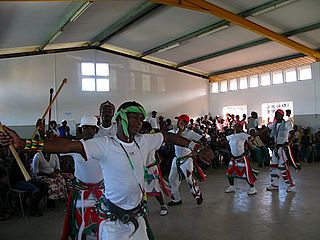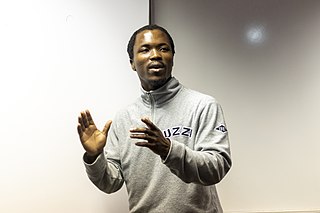Cato Manor is a settlement located 7 kilometres (4.3 mi) from the city centre of Durban, South Africa.

Abahlali baseMjondolo is a socialist shack dwellers' movement in South Africa which primarily campaigns for land, housing and dignity, to democratise society from below and against xenophobia.

Sibusiso Innocent Zikode is the president of the South African shack dwellers' movement, which he co-founded with others in 2005. Abahlali baseMjondolo claims to have an audited paid up membership of over 115 000 across South Africa. His politics have been described as 'anti-capitalist'. According to the Mail & Guardian "Under his stewardship, ABM has made steady gains for housing rights."

Kennedy Road is an informal settlement in Durban (eThekwini), in the province of KwaZulu-Natal in South Africa. Formed in the late 1970s or early 1980s, the settlement was mentioned by the African National Congress (ANC) after the end of apartheid but amenities were not improved. The site is mostly not connected to sanitation or electricity. Dissatisfaction with local councillors led to 2005 protests including a road blockade, out of which the shack dwellers movemment Abahlali baseMjondolo (AbM) formed. In 2009, an AbM meeting was attacked resulting in two deaths and a court case. More recently, the municipality has improved facilities and promised to relocate inhabitants.

The Landless People's Movement is an independent social movement in South Africa. It consisted of rural people and people living in shack settlements in cities. The Landless People's Movement boycotted parliamentary elections and had a history of conflict with the African National Congress. The Landless People's Movement was affiliated to Via Campesina internationally and its Johannesburg branches to the Poor People's Alliance in South Africa.
eMacambini is a rural area in the KwaZulu-Natal province of South Africa which is mostly populated by members of the Macambini clan. It is near Mandeni on the Zululand coast, just north of Durban and close to the new King Shaka International Airport.
Rubin Phillip is bishop of the Anglican Diocese of Natal. The great-grandchild of indentured labourers from Andhra Pradesh, Phillip is the first person of Indian heritage in South Africa to hold the position of Bishop of Natal. He grew up in Clairwood, a suburb of Durban with a large concentration of people of Indian descent, in a non-religious household, but converted to Christianity. He was a noted anti-apartheid activist and spent three years under house arrest in the 1970s and was banned in 1973. He was enthroned as bishop in February 2000.
Willies Mchunu was the 7th Premier of KwaZulu-Natal province in South Africa. He was previously a Member of the Executive Council (MEC) for the Department of Transport, Community Safety, and Liaison in the province. He is a member of the African National Congress and the former chairperson of the South African Communist Party (SACP) in KwaZulu-Natal and is a member of the Central Committee of the SACP. He is seen as a close ally of former South African President Jacob Zuma.

The KwaZulu-Natal Elimination and Prevention of Re-emergence of Slums Act, 2007 was a provincial law dealing with land tenure and evictions in the province of KwaZulu-Natal in South Africa.
The Constitution of South Africa protects all basic political freedoms. However, there have been many incidents of political repression, dating back to at least 2002, as well as threats of future repression in violation of this constitution leading some analysts, civil society organisations and popular movements to conclude that there is a new climate of political repression or a decline in political tolerance.
Fire is a serious hazard in shack settlements in South Africa. It has been argued that "On average in South Africa over the last five years there are ten shack fires a day with someone dying in a shack fire every other day." In 2011, 151 were reported to have been killed in shack fires in Cape Town. It was reported that in 2014, 2,090 people burned to death in the Gauteng province, "many of them in shack fires that sweep through informal settlements".
There have been many political assassinations in post-apartheid South Africa. In 2013 it was reported that there had been more than 450 political assassinations in the province of KwaZulu-Natal since the end of apartheid in 1994. In July 2013 the Daily Maverick reported that there had been "59 political murders in the last five years". In August 2016 it was reported that there had been at least twenty political assassinations in the run up to the local government elections on the 3rd of August that year, most of them in KwaZulu-Natal.
In March 2013 around a thousand people occupied a piece of land in Cato Crest, Durban and named it Marikana after the Marikana miners' strike. Mayor James Nxumalo blamed the occupation on migrants from the Eastern Cape. He was strongly criticised for this by the shack dwellers' movement Abahlali baseMjondolo who said that "The City Hall is red with blood".
Bandile Mdlalose is a former general secretary of the South African shackdwellers' movement Abahlali baseMjondolo. She is now the President of the Community Justice Movement which operates in some informal settlements of Gauteng and KwaZulu Natal.
Nqobile Nzuza was a resident in the Marikana Land Occupation in Cato Crest, which is part of Cato Manor in Durban, South Africa. She was a member of the shack dwellers' movement Abahlali baseMjondolo.
Nkululeko Gwala originally from Inchanga in KwaZulu Natal, was a resident of Cato Crest, which is part of Cato Manor in Durban, and a supporter of the Marikana Land Occupation (Durban). He was also a prominent member of the shackdwellers' social movement Abahlali baseMjondolo and chairperson of their Cato Crest Branch. He was assassinated on 26 June 2013.

Nokuthula Mabaso, was a prominent leader in Abahlali baseMjondolo and one of the leaders of its women's league. She was a leader in the eKhenana Commune. She was assassinated on 5 May 2022.

Ayanda Ngila (1992–2022), was a land activist, a prominent leader in the shack dweller's movement Abahlali baseMjondolo and deputy chairperson of its eKhenana Commune. He was assassinated on 8 March 2022.

Lindokuhle Mnguni was a land activist and a prominent leader in the shack dwellers' movement Abahlali baseMjondolo. He was chairperson of the movement's youth league as well as the chairperson of the eKhenana Commune. He was a leader of eKhenana's food sovereignty project which sought to make the commune more self-sustaining and independent. He was assassinated on 8 August 2022.











